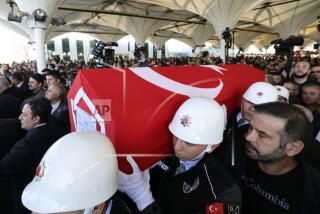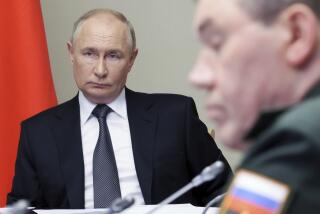Turkish Troops Kill 90 Kurdish Rebels : Military: Incursion into Iraq seeks to destroy guerrilla bases. Baghdad protests raids. Diplomats fear strategy won’t help win over Turkish Kurds.
- Share via
ISTANBUL, Turkey — Government troops have killed 90 Kurdish guerrillas in their three-day “Operation Raider” into northern Iraq, the latest blow in Turkey’s controversial but unrelenting fight to find a military solution to its festering problem with rebel Kurds.
State television said five Turkish soldiers have been killed since the commandos crossed the high mountain border at dawn Wednesday. Their mission is to destroy bases of Turkey’s separatist Kurdistan Workers Party (PKK), just inside Iraq and close to the frontier with Iran.
The force of up to 3,000 Turks was backed by fighter-bombers. Iraqi Kurds in nominal control of the area said the 10-mile-deep Turkish incursion had forced about 3,000 civilians to flee from 18 villages, many of them only recently rebuilt after their destruction in the 1991 Persian Gulf War and many years of conflict with Iraqi President Saddam Hussein.
The Turkish military characterized Operation Raider as only a small-scale replay of March’s Operation Steel, in which 35,000 Turkish soldiers occupied areas of Iraq for six weeks and made Turkey the target of intense European criticism. Turkey denied claims that its planes had bombed villages.
“Small units of troops are already gradually in the process of withdrawing,” said Col. Dogu Silahcioglu, a Turkish armed forces spokesman who added that the operation will last at least a few more days.
Iraq fiercely criticized Turkey’s action, calling it a “flagrant violation of Iraqi sovereignty,” even though Baghdad accepted Turkish “hot pursuit” raids in 1986. The Kurdistan Democratic Party of Iraq said the raid “held the will of the local authorities in contempt.”
The Turkish Foreign Ministry said a “vacuum in authority” had forced Turkey to act.
*
U.S. diplomats broadly supported their North Atlantic Treaty Organization ally’s right to protect itself against the PKK, which the United States and most European governments list as a terrorist organization. The group, whose ideology mixes Stalinism and Kurdish nationalism, is mainly supported by Syria.
In Washington, Navy Capt. Mike Doubleday, a Defense Department spokesman, told reporters of “the need [for Turkey] to limit the scope and duration of the operation and to safeguard human rights.”
But Western diplomats are more worried that the Turkish tactics are simply not winning over Turkey’s 12 million Kurds, about one in five of its population. Inside Turkey, casualties have steadily worsened and grown more widespread in the 11-year-old rebellion that has killed 17,000 people.
*
In northern Iraq, Iraqi Kurdish groups have been too busy struggling among themselves to control the single-minded Turkish Kurd PKK rebels. And the PKK’s simple ideology promising an independent Kurdistan for the Middle East’s 20 million Kurds is proving increasingly appealing to disillusioned Iraqi Kurds.
Robert Deutsch, the State Department director of northern Gulf affairs, returned to Turkey on Friday after a week in northern Iraq, partly to try to patch up relations between the feuding Iraqi Kurdish factions.
Meanwhile, the powerful Turkish armed forces seem unlikely to change their tactics. Gen. Ahmet Corekci, the military’s No. 2 leader, told reporters last week that the army would not support the Kurdish political and cultural concessions suggested by the West.
More to Read
Sign up for Essential California
The most important California stories and recommendations in your inbox every morning.
You may occasionally receive promotional content from the Los Angeles Times.









